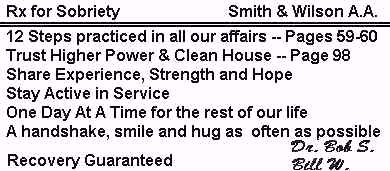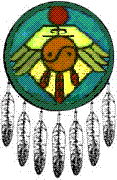

 Click The Images To Go To Page Indicated In The Flag For Men Only? One of AA's first woman members describes her pioneering struggle to gain acceptance of her sex in what was exclusively a man's world of sobriety WHEN I attended my first AA meeting on April 11, 1939 I was the only woman alcoholic there. And I might not have been there had there not been one before me whose story I had read in the manuscript of a book called "Alcoholics Anonymous." Some weeks before, my psychiatrist had handed me a red cardboard-covered document, saying flatly that he had about given up hope of being able to help me after nearly a year of intensive treatment in the sanitarium he headed. But, he added, he had just read something that might help, and he wanted me to read it. He said little more, except to remark that this group of men (the emphasis is mine) seemed to have discovered a way out of the same trouble I had -- drinking. I took the book in trembling hands and went back to my room with a wild surge of hope lifting me up the stairs three steps at a time. As I read, the hope swelled and sank again and again. My trouble had a name: alcoholism. It was music to my ears. Alcoholism was a disease. Shame, guilt and self-condemnation rolled away like heavy fog, letting light and air into my heart again. I could breathe; I could bear to live. Alcoholism was "an 'allergy' of the body coupled with an obsession of the mind"; there was no known way of reversing the sensitivity of the body to alcohol, therefore an alcoholic could never safely drink again. This was the first reason I had ever heard that made sense to me. I could accept it. I could face a life without drinking, because I had to; there was no choice -- my body wouldn't let me. It wasn't just a question of mental aberration after all; I wasn't insane, or hopelessly neurotic; I had a disease. And thousands of other people had it, too. I wasn't the only one; I wasn't so peculiar, so different, so alone beyond the pale. I had a disease! My mind made a song of hope out of those words. Then came the let-down. This handful of men had found an answer to the "obsession of the mind" that drove them to drink against their own will, against their own desire, against not only their better judgment but against their own good. That answer was God. My hope sank. This was not for me. I couldn't use this answer. I had lost God in my teens. I had outgrown this primitive notion. I was an intellectual, a worldly, widely-travelled, well-educated once-successful woman. A woman. My hope completely disappeared. This was a man's book, entirely about men, obviously written by and for men, and a particular kind of men at that -- religious men. Well, that was that. I wasn't religious, and I wasn't a man. I'd have to find my own way out after all. I was still alone. And so I argued with the doctor, day after day and week after week, about the God business. Patiently he let me get my arrogant, infantile arguments off my chest. Firmly he would send me back to "read some more," for I was creeping through the book, dragging my feet over each arguable phrase. He had quickly answered my complaint that this was a book for men only by saying simply, "What's so different about women suffering the same illness?" But this had seemed no more satisfactory an answer to me than his careful parrying of my arguments against God. I had consigned myself to outer darkness and there I would stay, alone with my ego and my pride. Until the day came; the day the crisis in my personal life did exactly what the book had said it would. It raised the bottom to where I precariously hung, and I fell right into God's hands. Gloriously, joyously, ecstatically surrendered to complete faith in a Power greater than myself. I was free. So free that I knew I could walk out my third-story window and keep right on walking. God supported me at a level I had never dreamed was possible, and there was no prison -- neither of my own making, nor of the wood and stone that made the sanitarium, nor of gravity itself -- that could contain me. I was free! A vestige of my old suspicions sent me running to the doctor. Was I now completely mad? If so, I liked it. Sanity was never like this; I felt wonderful, happy, radiant, bursting with love and delight. The grass had never been so green, the sky so blue, people so nice and so good. The world was a divinely beautiful place. . . . I was free. "Perhaps you are," the doctor said, "for I believe you have had an authentic spiritual experience. Hold on to it, and go back and read that book!" I did, and it seemed a different book. True, it was still obviously by and for men, but it held truth for me and I gobbled it up. For the first time, I read it through to the end. And there I found, among the personal stories, one entitled "A Woman's Story." Thank You, my newly found God. I might have known You would supply everything I needed. For a while it seemed the book held everything I needed. I was reluctant to meet the people. I was too busy revelling in a state of mind I had never known: a beatific state of pure delight in living. Yet I was really a little afraid -- of what these men would be like, of how they would accept me, a woman. Would one other woman be enough? Would she like me and accept me? Would she be there if I went to meet them? Would the reality of flesh and blood spoil my ecstatic dream? Was it a dream? Weeks passed and the good doctor took matters into his own hands; he made a date for me to meet one of these men and his wife, and to go with them to a meeting in Brooklyn. I was warmly received; first names were the rule, they told me, and Mrs. M. -- Sandy -- made me feel more than welcome. We had dinner and set off for Brooklyn, to Bill and Lois's brownstone house. The first floor seemed crowded as we entered. I saw many women among the crowd, but no one looked as if they had ever had a drink. It looked like any friendly gathering in any home, with far too many strangers for my taste. I flew upstairs to leave my coat and lingered there. Lois came up and put her arm around my shoulder. "We want you down with us," she said. "You are very welcome." And she looked as if she meant it. I think I have never seen such sheer lovingness shining out of a person -- it warmed and comforted me. Lois, a non-alcoholic wife, taught me about love. But that's another story. I was made welcome, and yet -- did I notice just a flicker of uncertainty? Just a slight wariness, a kind of disbelief on the part of these men that I could really be one of them? I did, for some of their questions revealed it. I was the youngest person there, by far. And I was a woman. I was fairly well-dressed, was currently an inmate of a rather expensive private sanitarium (they didn't know I was stony broke, was there on a "scholarship" for free), and was obviously from a "good" background -- well-brought-up, well-educated, and apparently meeting the specifications for that old-fashioned label "a lady." These things are not usually associated with drunken women, even in the minds of drunken men. This I knew from my own experience. So I identified myself, and found myself telling the naked truth about my drinking as I had never been able to do even with my doctor. And I noted the small intake of breath, the widening of eyes, the retreating but still dormant suspicion in some of my questioners. But for enough of them, I made the grade. I was accepted as an authentic alcoholic, and therefore a qualified participant in the meeting. There were a number of non-wives and friends present, for this night was an occasion: the first printed and bound copy of the book "Alcoholics Anonymous" was on display. I knew I was in when I was asked to sign the copy, along with the rest. And I further knew I was in when I found myself talking almost exclusively to the men who were alcoholics. They so surrounded me, and asked so many questions, that I knew I was indeed a rarity -- something of an occasion myself. As soon as I decently could, I asked about the woman whose story was in the book. She was much older than I, with grown children. Her name was Florence. No one seemed to know her except Bill and Lois, for she was in Washington where one of the earliest members of the group, a man named Fitz, was trying to get something started. He was having a very rough time, for all the prospects, including Florence, kept getting drunk. I breathed a prayer of thanks that she had stayed sober long enough to write her story -- for me. Bill said that she and Fitz would be coming to New York soon, and I could meet her. There were hopes, Bill said, that the one other group, in Akron, might have a woman member soon -- they were working on one. But here in New York I had to face the fact that I was, indeed, alone. Unique. I didn't like it. I had been feeling alone and unique for far too long. At least the men here were like me. Or were they? I began to understand the faint uncertainty, the wariness, the disbelief. I began to wonder myself if this program would work for women. I could deal with their questions about my rights to the title of alcoholic -- I had qualifications to match anyone's -- but only time could deal with their unexpressed doubts as to the ability of a woman to live their program successfully. And only time did the job. The first year was the hardest. I had plenty of prospects but few results. All that long hot summer I went into New York once a week to the meeting, hoping a woman might appear, find me, know that she was not alone and unique, and stay. Florence came, and left, without any real contact being established between us -- she did not seem to want to talk. I saw her only once again, sober, and then she died on a drunk. I found it difficult to convince the older members that I wasn't a freak, the only one of my kind, and to convince the newer men that there was such a thing as a woman alcoholic and that I was one. The newer men often found it difficult to conceal their disgust at the idea, and more than once I heard, "If there's one thing I can't stand, it's to see a woman drunk!" They just couldn't believe that women couldn't help it any more than they could. Most of the men were wonderful, and fully accepted me as one of themselves, but there remained a curious loneliness, nonetheless. Finally, in October, came Nona, whom I had met when I entered the sanitarium nearly two years before. She came in wholeheartedly, a quiet girl not wanting to be noticed, but she was there. In November I went with Bill and Lois to Akron and called on the woman (drunk in bed) for whom they had had hopes, but I was no more successful than the men had been. I went on to Chicago where Sylvia lived -- Sylvia who in October had gone to Cleveland to find AA in the home of an early member, and who had returned to Chicago full of sobriety and zeal to help others. Now there were three of us the country over -- but three is a crowd. Three can be neither alone nor unique, and we were all three too different to be the same kind of a freak! We used to hold long discussions as to why it was so difficult to help women, why they couldn't stay sober, couldn't make this program work. Some of the men thought it was because women were more dishonest than men, less direct. "Sneakier" was a word they used. I had to agree that this fitted most cases and that it made my self-appointed task of getting women into AA almost impossible. But I thought I understood the reasons for this -- and I still think they are the reasons that keep many women from success in AA. We have a double standard in our society. Many things that are acceptable, or at least forgivable, in men are not in women. Although the high pedestal on which women used to be enthroned is slowly descending to a more realistic level (and most women are duly grateful for this entry into more comfortable realms), it is doing so only in fits and starts, like a balky elevator. There are still areas of behavior that are forbidden to "nice" women, and excessive drinking is one of these. Many men who are themselves alcoholic and because of this have committed every sin the book, are inclined to look down their noses at women who have suffered the same mishaps, and for the same reason. They can't be "nice." Many non-alcoholic wives are inclined to be even more sure of this last statement, and not to want their husbands to associate with such questionable types. Women know this, of course, and the moment their drinking shows signs of being different, even slightly out of control, they instinctively go for cover, and bend all their effort to concealment. They become past masters at deception, at hiding their condition and the cause of it -- their bottles. Their opportunities are great if they are housewives, as many of them are. They are alone and in command of their environment for most of their waking hours. By the time their control is completely gone and they are discovered, they have built a pattern of deception that is nothing short of superb. Such a fantastic construction, built so painstakingly for so long, does not fall to pieces easily, and they have trained themselves so well to safeguard and protect it under all circumstances, even helpless drunkenness, that they often cannot relinquish this "protective coloration" even when they finally want to and know that they must if they are to live. The double standard has created another hazard for the woman seeking help in AA. Men are not supposed to care too much about "what the neighbors say" or "what will Joe think of you," but women most definitely are. Girls are brought up to consider other peoples' opinions of them, first and foremost. When a woman starts drinking too much, and then uncontrolledly, this becomes a prime bugaboo that haunts her sober moments. Unfortunately, the name Alcoholics Anonymous is frequently all mixed up in her already mixed-up thoughts with the total unacceptability of alcoholism, alcoholics, and everything to do with both, to most of the people she knows and whose opinions of her she has been taught to value above all else. How can she fly in the face of all she holds most dear, and pin this taboo label on herself? Better to hide in the bowels of the earth, or the bottom of a bottle. Finally, there are the misconceptions of an earlier more prudish day, when only "loose women" were supposed to drink; ergo, women who drank were "loose women," and if they drank badly, they were "lost women." The scarlet letter has hung like a terrible barrier in front of many women who desperately needed what AA had to offer them. And I may add that the scarlet letter has been pinned on many innocent alcoholics -- whose only sins (?) were those of alcoholism -- by self-righteous or fearful nonalcoholic women -- and men, too. Man's inhumanity to man might better read "women's inhumanity to women" particularly in the smaller communities of our enlightened country. These, I think, are some of the valid reasons why the growth of the number of women in AA was painfully slow at first, and even now is amazingly greater in the big cities than in even their own suburbs, let alone smaller towns. Yet growth there has been, and a commensurate change in attitude both within and outside of AA. For women have recovered and gone back to their own close little societies to talk about it, to teach them to know better, to let their own stories be known in the hope that they might reach into some other room, secluded and well-hidden as their own once was. Women who have embraced AA have found the God-given courage to face their whispering accusers, and to face them down; to hold on to their sobriety and to build from it a good life, open to the most critical inspection; to accept new values that do not give weight to "what the neighbors think -- or say"; and to rely on their own conscience in communion with their own God as they understand Him, for judgment of their worth. All this is not easy. I think it must be said that because of cultural and environmental patterns which are beyond her control, it is not yet the same for a woman to have alcoholism as it is for a man. It is much, much more difficult, and the chances of finding help and achieving recovery are undeniably less. Yet there has been improvement over the past twenty years, and I believe that the situation will become progressively better as alcoholism is more widely accepted for the disease that it is, and the unfair stigma gradually disappears. Public acceptance will one day bring about the cultural and environmental changes that are beginning to be evident. The double standard has no place in the realm of illness, and never did have. Once alcoholism is firmly esconced in that realm, much of the old prejudice against women alcoholics will die a natural death. But it is a long, slow process. Five years after I came into AA, in the spring of 1944, the several large AA groups in Pittsburgh asked me down to speak at a public meeting. They told me outright that they wanted to show Pittsburgh that there was such a thing as a woman alcoholic, and that she could recover. Still, it was many months after that before they got their first woman member. Groups have written me from all over the country to say that after four and five years of intense activity and growth, they had yet to have a woman member; I have made countless trips and many speeches to show myself and give evidence of the possibility. This was a major reason why I temporarily gave up my doubly precious anonymity (being a woman and therefore vulnerable to scarlet letters and a host of other unpleasant things) when I entered public work in this field. No one was ever happier to resume that protective cloak after two years of both veiled and crass remarks and looks. It takes great faith and plenty of sheer strength to be an avowed woman alcoholic. I am both humbled and proud of my sex as I see the growing numbers who dare -- for the sake of all those others still undeclared, still suffering the tortures of the damned, alone. Things move. During the late 1940s I had many letters from lone woman members, seeking comfort, company, and advice on how to find and bring in others. Then in the 1950s I began to be asked to come and speak at luncheons and dinners of just AA women. I thought the corner had been turned, that no one could ever again imagine AA was "for men only." Imagine my shock and horror when in December 1959, twenty years and eight months after my solo landing in AA, a woman member in a great mid-western city I was visiting told me of several AA groups in the city who would not receive women as members -- stated flatly that they did not want women in their groups. Several men with us corroborated her story, adding, before I could catch my breath, that it didn't matter so much in a big city like theirs where there were plenty of other groups a woman could go to, but what bothered them was the fact that this was true in many small cities and towns where there was only one group, so that in effect this meant denying AA to women alcoholics. I could hardly believe my ears, but the people who told me this were not erratic, newly sober alcoholics, but longtime members who know their area well and traverse it frequently. If this is so, in the mid-west, it may very well be so in many parts of our vast country, especially in sparsely settled areas with only small towns. There obviously remains much to be done. After twenty years, women coming into AA are still pioneers. Those who make statistical studies claim that there is only one woman alcoholic for every five-and-a-half men. The records of public outpatient clinics seem to bear out this figure. But there are many physicians in private practice, where a confidence is considered as sacred as in the confessional, who state categorically the women alcoholics outnumber the men in their practice. Certainly in the big cities, one often finds the women outnumbering the men at closed meetings. Is it just that women alcoholics more readily find their way to the anonymity of the big cities? Or are there more of us than even we think? Once again, only time will tell us. But I hope and pray it won't have to be another twenty years for all those out there alone.
Index of AA History Pages on Barefoot's Domain As in so many things, especially with we alcoholics, our History is our Greatest Asset!.. We each arrived at the doors of AA with an intensive and lengthy "History of Things That Do Not Work" .. Today, In AA and In Recovery, Our History has added an intensive and lengthy "History of Things That DO Work!!" and We will not regret the past nor wish to shut the door on it!!
KEEP COMING BACK!
On the Web July 28, 2006 in the Spirit of Cooperation Three mighty important things, Pardn'r, LOVE And PEACE and SOBRIETY |

